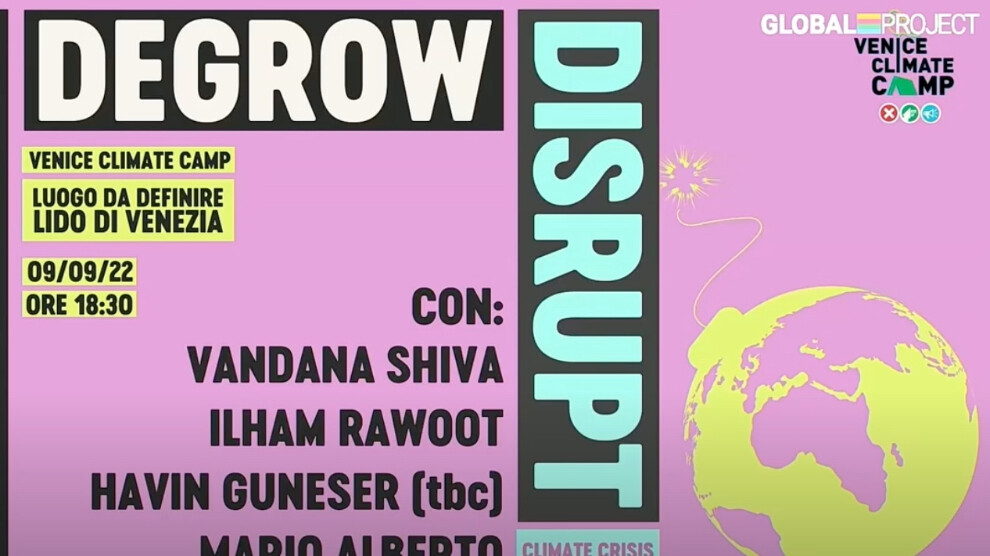Venice Climate Camp discusses Abdullah Öcalan's idea
“Let’s change the system, not the climate” was this year’s slogan of the Venice Climate Camp, where Abdullah Öcalan's ideas were also discussed.
“Let’s change the system, not the climate” was this year’s slogan of the Venice Climate Camp, where Abdullah Öcalan's ideas were also discussed.

“Let’s change the system, not the climate” was this year’s slogan of the Venice Climate Camp, which took place from the 7th until the 11th of September. Speakers and activists from around the world were gathered in Venice Lido, a town that lives under the threat of being flooded by rising tides. While the Venice Film Festival, which took place in the same week, drew global media attention, activists attended the climate camp to draw attention to the climate crisis, with the aim to collectivize action for climate justice.
The central theme of this year’s 3rd edition of the climate camp was decoloniality. Together with ecofeminist author and activist Vandana Shiva, Ilham Rawoot (Friends of the Earth), and Mario Alberto Castillo (Asamblea de Pueblos Indigenas del Istmo en Defensa de la Tierra y el Territorio, afferent to the Congreso Nacional Indigena), Havin Guneser, the spokesperson of the International Initiative “Freedom for Abdullah Öcalan – Peace in Kurdistan” participated in a panel on “Decolonize, Degrow, Disrupt” as a keynote speaker.
Together with Vandana Shiva, who emphasised how the earth is “our common home” and Rawoot, who defined ecology as “the relationships between all beings”, the International Initiative’s spokesperson, by way of introducing the political thought of Abdullah Öcalan, stated that “the capitalist system is trying to impose on an understanding of ecology as a very isolated case of relationships that do not include the human relations (…) but ecology is actually the science of all these relationships including the human society”.
According to Öcalan, as presented by the initiative, the struggle against colonialization is not merely a physical struggle, but also an ideological one. Against this backdrop, the initiative’s spokesperson emphasised how people have become dependent on being wage-earners to an extent that their dependency is what leads to the very reproduction of the hierarchical system.
With references to the Kurdish freedom movement’s fight against the Islamic State group ISIS and the victory of Kurdish women fighters in this struggle, the spokesperson reminded the audience that there is more behind this revolution that needs attention and one must ask how the colonization process of humanity has allowed all this to happen and what set of relations have allowed for this.
“Abdullah Öcalan and the Kurdish freedom movement go back to history and connect it to the present to be able to imagine a different life and to ask how we can bring back enchantment to life”, the spokesperson added.
Central to Öcalan’s thought is the process of questioning and re-questioning, so we do not regenerate the hierarchies and processes of enslavement in our lives.
According to the philosophy of the Kurdish freedom movement and the ideas of Abdullah Öcalan, the question, therefore, is not “how do we get a better share as workers, but how do we not become workers”, the spokesperson continued. On this note, Vandana Shiva added in agreement “first they told us you can only be workers and earn a living. Forget your land. Forget your seeds. Forget your knowledge. Whilst now we are being told that we don’t need workers because artificial intelligence will do everything for us”. That this destruction of relationships between humans and nature not only poses a risk to the environment but also to human society was central in the panel discussion. In this context, Öcalan’s term of societycide was introduced by the initiative, to which Vandana Shiva added “this moment where we are threatened with extinction is where we can build another world. It needs, as Guneser said, deep love, solidarity, and trust in the earth and humanity”.
“Kurds have been at a point of extinction for a long time, both their land and theirs as a cultural and linguistic group. This has made them question and re-question everything. As the site of a third world war, where Kurds are fighting for their lives, they are making revolution each and every day because they know that revolutions are not an overnight thing”, the initiative’s spokesperson emphasized.
While capitalism is often defined by its destructive nature through weapons, Öcalan has put forward that the greatest weapon of capitalism is “its ability to change our mentality and to legitimize it”, as well as to “destroy our imagination of an alternative way of life,” as presented by the spokesperson of the initiative.
Taking the ways the Kurds mobilize and organize their lives in Rojava, Maxmur, Bakur, Shengal and elsewhere together with different communities as an example, the initiative’s spokesperson stated that if there is an ideological narrative that we cannot exit the cycle of capitalism, “we have to map out a philosophy and an ideological line of how this can be done”. Adding, “there must be a struggle first at the level of our mindsets to be a community together again and to set the harmony right with nature. Without doing that, the 1% is going to rule us as they are at the moment. They bet on us being scared, they bet on us not collaborating”.
Öcalan’s call to dare to imagine more and to act collectively resonated well with Alberto Castillo Quintero’s final words when he said: “We have a dream that one day we can mobilize from different parts of the world at the same time and act together in the common struggle against the system”.